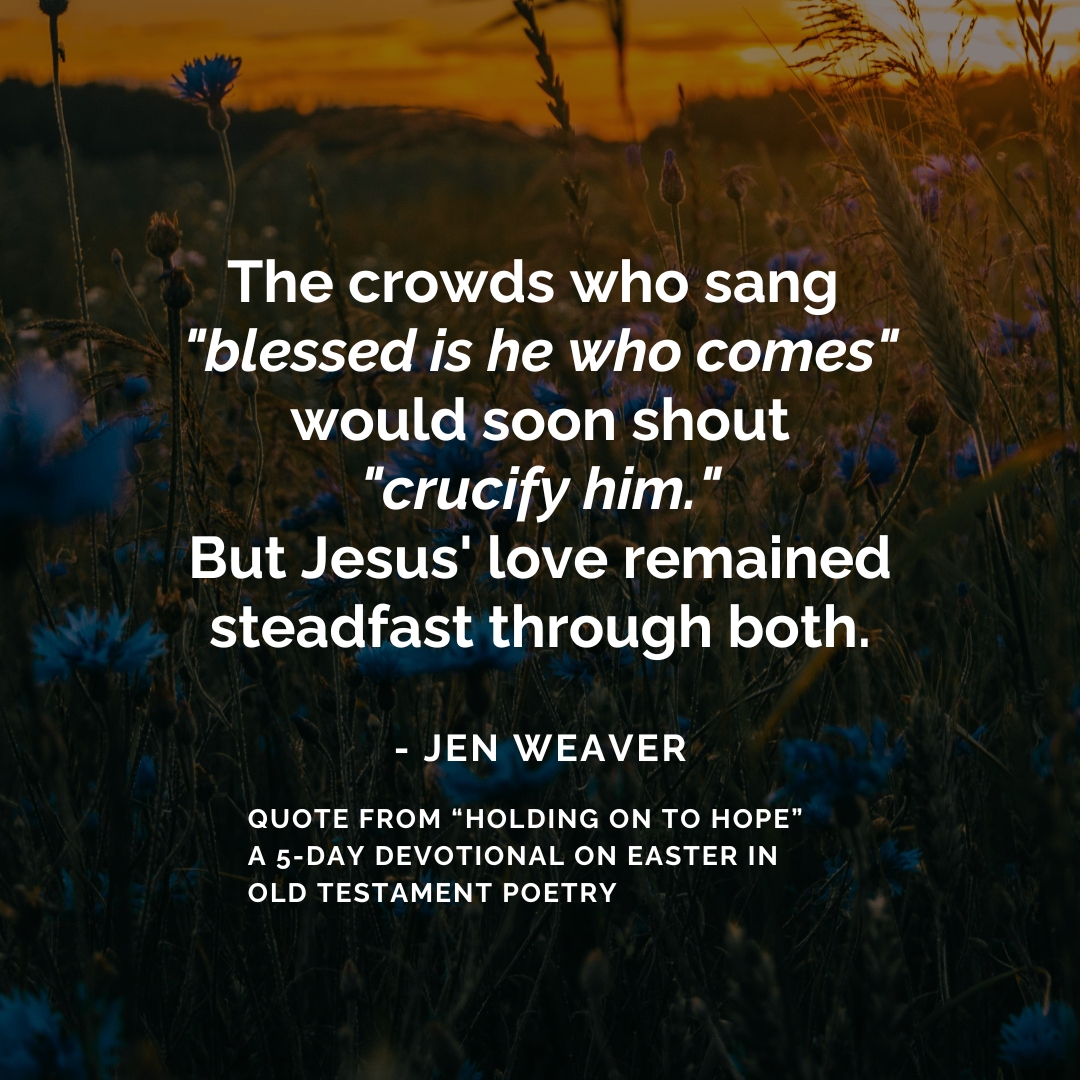Holding on to Hope: Easter in Old Testament Poetryنموونە


God’s love for you is loyal. You can’t lose it or outlast it. His love endureth toward you.
God’s steadfast love forms the heartbeat of today's poem, also known as Psalm 118. As you read, notice how the poet repeats words and uses parallel structures for emphasis.
Much—but not all—of biblical poetry is found in the psalms, and the Israelites had routines to help them remember key messages from God throughout their history.
I've seen the power of routines in my own home. As a mom of two elementary-age boys, our daily rhythms—morning wake-ups, after-school arrivals, and bedtime rituals—help my children prepare for what comes next. Routines also anchor important truths. My husband and I repeat the same phrase each night: "I love you with my whole heart, no matter what, forever and always." Our boys can now finish this refrain, and they quickly correct us if we playfully change a word.
Routines can anchor us in truth. Repetition builds recognition. What we repeat, we remember.
The Israelites used Psalm 118 this way. The poem is in the “Egyptian Hallel” collection of Psalms 113-118, traditionally associated with Passover.
- According to scholars, Jewish pilgrims would sing these psalms on their way to Jerusalem for Passover. The annual feast stood as a lasting memorial of God’s steadfast love and rescue.
- Psalm 118 specifically would be sung responsively between Levites and pilgrims who approached the temple to worship.
- Families would sing Psalms 113-114 before the Seder meal and Psalms 115-118 afterward.
When Jesus entered Jerusalem before Passover (what we now call Palm Sunday), crowds spread their cloaks on the road before Him, waved palm branches, and shouted words straight from Psalm 118: "Hosanna...Blessed is he who comes in the name of the Lord!" (Matthew 21:8-9) Later, when challenged in the temple, Jesus quoted the same psalm:
“Have you never read in the Scriptures: ‘The stone that the builders rejected…’” (Matthew 21:42a)
Of course they'd read that verse—the religious leaders likely recited those very words that day.
Fast-forward to the night of His betrayal. At the Last Supper—a Passover celebration—Jesus and His disciples likely sang part of Psalm 118 together. There, the disciples celebrated God's salvation through the original sacrificial lamb, while seated with the Lamb of God Himself.
This poem reminded God’s people of His steadfast love. The habit of repeating its refrain reminded them to hope for their Messiah.
I wonder how this routine must have reminded Jesus.
His years on earth resounded with promises of rejection. Since childhood, this Passover routine echoed to young Jesus what awaited Him. He sang about it. He lived toward it. He embraced it. For us.
Jesus experienced that rejection as leaders and locals accused His ministry, attacked His identity, and eventually took steps to have Him killed.
The crowds who sang "blessed is he who comes" would soon shout "crucify him." But Jesus' love remained steadfast through both.
Our Savior didn’t change course or remove Himself. He became the cornerstone. His steadfast love endures forever.
May we see God’s love on display with fresh eyes today. Tomorrow we’ll explore a poem about Christ’s sacrifice that sounds like an eyewitness account, but actually was written 700 years in advance!
دەربارەی ئەم پلانە

In the midst of despair, find hope. In the depths of doubt, fuel your faith. In a season of stress or struggle, rest in your Savior’s embrace. Experience the profound hope of Easter through Old Testament poetry that foretold Christ’s resurrection. This illuminating 5-day plan from poet and Bible teacher Jen Weaver guides you on a pilgrimage to rediscover God’s unwavering presence and pursuit of your heart.
More
پلانە پەیوەستەکان

Easter Week in Paint

Embracing Your Identity as a Daughter of the King Through Infertility

31 Days in Proverbs

Colossians + Philemon | Reading Plan + Study Questions

My First Devotional

Running With Perseverance

Becoming More Effective in Prayer

Confidently YOU

Our Discipleship Journey: Part 2
